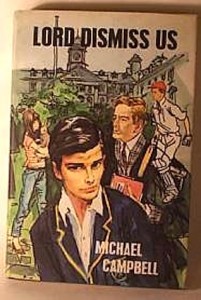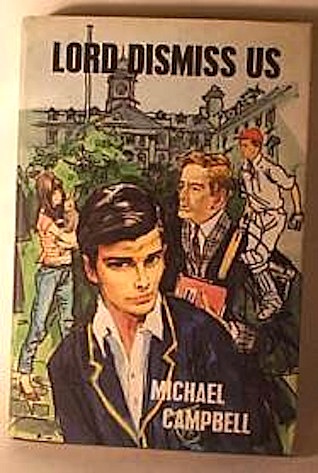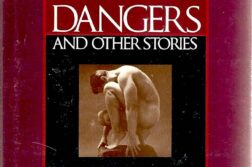BRITISH PUBLIC SCHOOLS—an educational institution roughly the equivalent of the elite private male boarding school in the United States, but far more influential in the formation of social identity and public policy—“are the nurseries of all vice and immorality,” harrumphs a character in Henry Fielding’s Joseph Andrews. In Boys Together: English Public Schools 1800-1864 (1984), historian John Chandos explains why Fielding the satirist (and himself a public school alumnus) should associate public schools with “vice and immorality”—that is, with homosexual activities.
Lonely to be away from home for the first time and thrown into this rough-and-tumble world just as they were passing through puberty, public school boys developed intense emotional relationships that might last only a few weeks, but also powerful bonds that might last a lifetime. What’s more, the “fagging system”—by which junior boys were expected to perform personal services for upperclassmen, such as cleaning their muddy boots, serving their tea, and running their personal errands—had the potential to create a sexually exploitative subculture. In the classroom during the daytime, the boys were schooled in Greek and Latin and  exposed intellectually, even if only obliquely, to the classical tradition of male same-sex relations. At night, in the large, one-room dormitories where the boys slept together, senior boys called “prefects” maintained order in the absence of adult supervision.
exposed intellectually, even if only obliquely, to the classical tradition of male same-sex relations. At night, in the large, one-room dormitories where the boys slept together, senior boys called “prefects” maintained order in the absence of adult supervision.
It is little wonder, then, that the Brits should have developed both a highly romantic literature of idealized adolescent friendships (for example, Tom Brown’s School Days) and an underground literature that eroticized corporal punishment, group sexual initiation, and intense teacher-student relationships.
The republication of the single greatest novel about public school life, Michael Campbell’s mordantly funny yet deeply moving Lord Dismiss Us, first published in 1967, is cause for jubilation. I first came across the book in 1984 on the New Releases shelf at the now defunct Oscar Wilde Memorial Bookstore in lower Manhattan, back in the days when there was such a constant stream of quality gay fiction being printed or reissued that I would go into the city seven or eight times a year to stock up on reading material and never left without a dozen or more new books. I was surprised to see that a gay novel, originally published in Britain in 1967, was being issued in the U.S. by the University of Chicago Press, a formidable academic publisher.
Chicago was also responsible for the American release of novels by Paul Scott, whose homoerotically-driven Jewel in the Crown was keeping us glued to PBS on Sunday evenings that year, as well as Joseph Pequigney’s Such Is My Love (1985), the first (and still the best) book-length study of the homosexual drama of Shakespeare’s sonnets. Thirty years ago, we still looked avidly for any possible pattern in the carpet, and when I finally settled down to read Campbell’s novel, I wondered what glorious fairy godfather was working his magic in a staid academic press’s acquisitions department.
The novel opens on the first day of a new term at Weatherhill Academy as Mr. Ashley, the young French master, introduces a class to Phèdre, Racine’s powerful drama about the destructive consequences of allowing oneself to be dominated by passion or sexual desire. The line on which Ashley focuses, “C’est Vénus toute entière a sa proie attachée” (“Venus, the goddess of sexual love, devours her prey”), sets the tone for the novel’s primary plot in which Carleton, a senior prefect, falls in love with Allen, a transfer student from another prep school who is two years his junior. The reader also discovers in the course of the novel that Mr. Ashley, while a senior at Weatherhill only six years earlier, had himself fallen hopelessly in love with a fellow student who, following graduation, entered the ministry, married, and settled into a life of unimaginative, unproductive conformity. The larger events of the novel are driven by the attempts of the new headmaster to stamp out the rampant “moral laxity”—to wit, homosexual activities—which he thinks is keeping Weatherhill a second-rate school.
Early in the novel, Ashley muses that adolescent boys are not particularly interesting because they have yet to develop a persona: “it was the surface or the particular in people that was precious.” And it’s impossible not to be seduced by the delightful eccentricity of Campbell’s adult characters. Cleanliness is most certainly not next to godliness for Rev. Cyril Starr, the school’s chaplain, who dresses in Firbankian splendor yet is attracted to those male students emitting the strongest body odor. Debating whether to invite the physically beguiling Carleton to his weekly tea, Starr decides in the negative because Carleton is almost certainly “a taker of showers.”
Similarly, when Mr. Brownlow calls lower-form boys individually to his desk to correct their Latin exercises, he keeps his left hand inconspicuously “on one’s bottom” during the lesson. A housemaster, he puts the younger boys to bed at night with a story that he tells while lying across one boy’s bed with his hand inside the chosen boy’s pajama pants. And there’s mathematics master Dr. Rowles, who—determined to identify the thief who’s been stealing from boys’ lockers—sits for hours on end in a bathroom stall with a mirror on the floor angled to reveal the comings and goings in the locker room. What he doesn’t realize is that the mirror allows the thief to see him as well. Finally, there is the chapel organist who directs the annual musical in which the prettier, more junior boys take the parts of the senior boys’ female love interests. Much to the homophobic headmaster’s outrage and the delight of the boys in the audience who are aware of Carleton and Allen’s affair, this year’s seemingly innocuous diversion requires the senior to woo and fondle his beloved on stage.
The richness of Campbell’s characters is in direct proportion to the very real threats that they face. For example, the reader learns only at the end of the novel that Rev. Starr is dying of cancer, making his delight in strong body odors his one means of stimulating the senses dulled by pain. Likewise, Mr. Ashley’s identification with Racine’s Phèdre extends to his committing suicide when, encouraged by the maturity that Carleton displays as Ashley helps him revise a short story for publication, the teacher tells the boy the nature of his feelings and is summarily rejected. And Carleton himself must not only suffer through the comedy of a boarding school romance but also the lifelong trauma of perjured love. “Farce is only tragedy seen in a particular way,” Ashley observes during an argument with a colleague. The strength of Campbell’s characters is that they maintain their eccentricity and independent point of view in the face of forces of social repression that seem poised to win out in the end.
Rereading the novel after thirty years, I’m struck by how powerful a political statement it makes, something that I missed entirely the first time I read it because I was too busy chortling at the comic excesses of Campbell’s characters. As Dennis Drabble notes in his introduction to this reprint edition, “Lord Dismiss Us was published in 1967, the year English law was amended to decriminalize homosexuality between consenting adults.” Fittingly, the novel invites reading as a satire of the worst excesses of the McCarthy witch hunts in America in the 1950s, when communism was associated with homosexuality, or the public scandals in Britain as the police rooted out supposed nests of sexual deviants. Proposing to hire a medical doctor who will investigate sexual goings-on at Weatherhill, the headmaster is certain “that those who are at present a disgrace among us will begin to see the error of their unnatural ways, and at the same time it will certainly be made more plain to them by the majority.” To which Dr. Rowles, the longest-serving member of the faculty who himself leads a rather abstemious life, quietly observes “that there is no remedy … for something which, whether we like it or not, is evidently natural to some—not to all. You may punish, expel, what you will, sir. But I fear you won’t eradicate.”
The novel’s ambivalent conclusion reflects its appearance at a transitional moment in gay social history. Distraught to realize that he misread the nature of Carleton’s affection for him, and that for six years he has been carrying a torch for a classmate who has not thought once about him in that time, Eric Ashley commits suicide. In this regard, Lord Dismiss Us closes on a tragic note, like so many other pre-Stonewall novels. At the same time, even though graduating senior Terrence Carleton is emotionally shaken by Nicholas Allen’s sexual perfidy, he is filled with hope as he packs his belongings into his parents’ car and leaves the world of schoolboy passion. The reader senses that, whatever the residual social opposition Carleton may face, he will be able to form and sustain a satisfying relationship with another man when the time comes. Unlike Racine’s Phèdre and Carleton’s influential teacher, Mr. Ashley, Carleton will find that “particular way” of looking at potentially tragic circumstances and redeeming them as farce.
Lord Dismiss Us, republished this year by Valancourt Books, is not only the greatest of English public school novels, but possibly the last. This is due in part to the sexual revolution that’s taken place since 1967. When the novel originally appeared in Britain, I was still in seventh grade, where reliable sexual information was so difficult to come by that my best friend Kevin Ronan and I spent an entire afternoon puzzling over whether “getting sucked off” and “getting a blow job” were the same thing. Such naïveté is impossible in the age of the Internet, so the sweetness of Carleton’s sexual awakening would most likely appear emotionally backward in a novel today.
Raymond-Jean Frontain is professor of English at the Univ. of Central Arkansas and editor of the academic quarterly ANQ.







Discussion2 Comments
I enjoyed the article: so much so, that I bought a copy of the book. Little did I know that it was an original copy that I received. I was in a “minor” boarding school in England in the 1960’s which was very similar to Weatherhill. We had enormous dormitories with senior prefects who did not hesitate to use their power to gain sexual favors. As it happened, I was very happy with that situation and used the same power when I was a Senior. I enjoyed the book although I do not think that it is necessarily the best boys’ boarding school novel: have you ever read Sandal, or St. Matthew’s Passion? I know that it was the 1960s and love between boys was not approved of, still less love between boys and masters. However, I think that the author deliberately ducks the issue by having the affair between Carleton and Allen end as it did. After all, it was Carleton who was shocked by the fact that he had an erection whilst lying on Allen after they had both agreed that nothing physical would take place. As I found out on numerous occasions agreeing that no physical activity would take place at the beginning of a relationship and believing the same later on in the relationship are two different things. Hormones have a habit of accelerating actions. As for Ashley’s suicide, I find that too melodramatic. In other words I think that this book was a product of its time and that the author could not let a gay relationship – whether between boys or boys/masters – end happily. I did not read into the story that Carleton would find another same sex relationship.
Many thanks to Mr. Frontain for calling attention to a great neglected novel. Unfortunately, he spoils the book for new readers by giving away the ending. Surely a spoiler warning would have been appropriate. I also wish Mr. Frontain had mentioned that “Lord Dismiss Us” has been recently reprinted by Valancourt Books, which has done much to resurrect unjustly forgotten books by gay authors.
I cannot agree with lwca597’s comments: far from being melodramatic, Ashley’s end was handled with brevity and lack of sentiment. Given that relationships between boys and masters DID end unhappily a good deal of the time, Campbell hardly “ducked” the issue. The book ends on a extremely hopeful note for Carleton, who even forgets his heartbreak, so there is no reason to not believe he would find another same sex relationship.